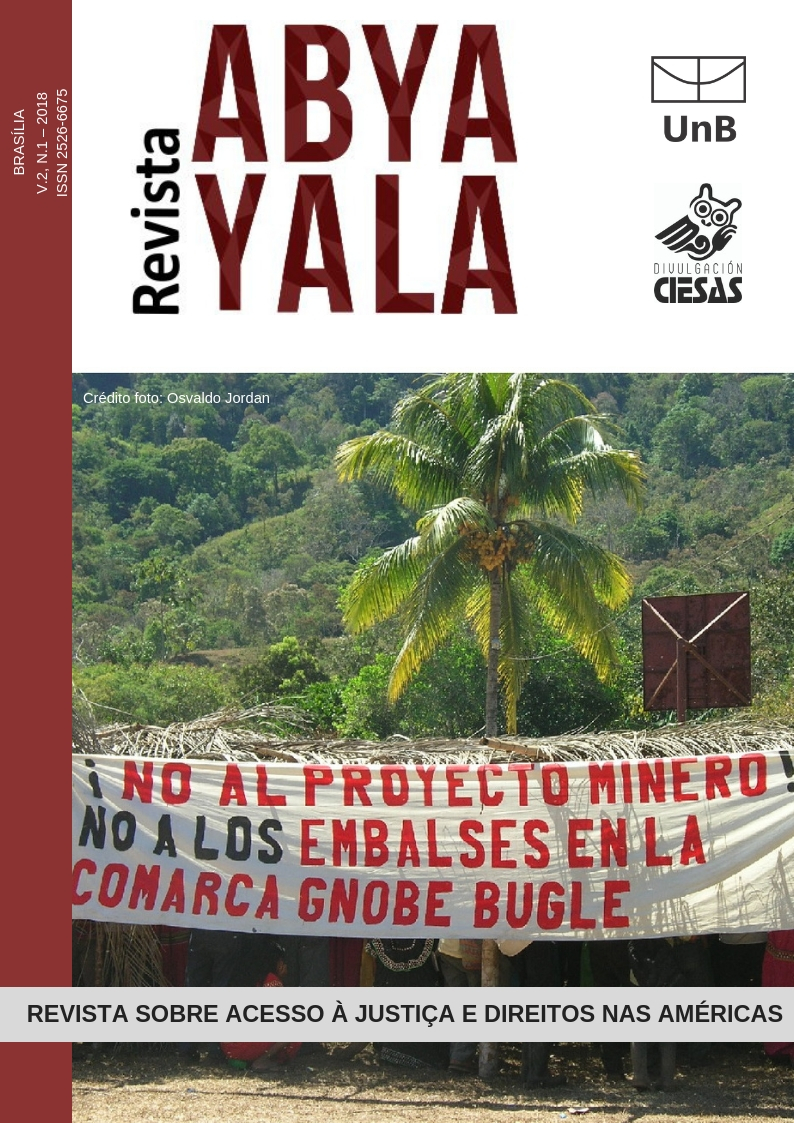Internecine between the Indian State and the Adivasis (indigenous people), under Neo-Liberalism
A case of Lanjigarh Resistance Movement
DOI:
https://doi.org/10.26512/abyayala.v2i1.10695Keywords:
Collective mobilization, Tribal protest movements, New social movements, Civil society, neoliberalismAbstract
The Anti-Vedanta movement at Lanjigarh had rocked the interior district of Kalahandi in the Indian state of Odisha. It was a fiercely fought movement (2002-2014) by the Adivsis (Dongria Kondh) against state of Odisha and VAL the mining based heavy metal MNC licensed under neo-liberal policy. The project had displaced 302 Adivasi families and was to mine in the Niyamgiri mountains to which the Adivasis were attached for livelihood and religious-cultural purposes. The displaced hence rallied around issues of cultural threats, environmental threats and inadequate R&R measures against loss of livelihood and natural habitat. The paper analyses empirically: (i) the threats posed to Adivasi identity by this so called modernization process by endangering their cultural patterns, social relations, economic organizations and pristine ecosystem. (ii) the inherent paradoxes of this development discourse based on neo-liberalism; as the state imposes a kind of development model with its right to develop its subjects (by over riding the subjects’ right to experience development differently). (iii) how the civil society guided the movement to ensure implementation of relevant legal provisions like, 5th schedule of the constitution, Article 244 (i), PESA 1996, FRA 2006 and Odisha scheduled areas act 1956 meant to protect Adivasis. It concludes that the state is being forced to share space with the civil society as a result of neo-liberalism.
Downloads
References
AMNESTY INTERNATIONAL , Executive Summary of Report: Don’t Mine Us out of Existence: Bauxite Mine and Refinery Devastate Lives in India, Index: ASA 20/004/2010, Tuesday 9 February, 2010. International Secretariat, Amnesty International, 1 Easton St., London WC1X 0DW, UK. https://www.amnesty.org/download/Documents/36000/asa200042010en.pdf
BABOO, Balgovind, “State Policies and People's Response: Lessons from Hirakud Dam”, Economic and Political Weekly, Vol. 26, No. 41 (Oct.12), pp. 2373-75 and 2377-79. 1991.
BANERJEE, Parthasarathi “West Bengal: Land Acquisition and Peasant Resistance at Singur”, Economic and Political Weekly, 41(16), pp. 4718”“20. 2006.
BAVISKAR, Amita, “In the Belly of the River, Tribal Conflict over Development in the Narmada Valley”, Delhi, Oxford University Press, 1995. 286p.
http://www.cseindia.org/node/1680
COHEN, Jean. “Strategy or Identity: New Theoretical Paradigm and Contemporary Social Movements”, Social Research, Vol 52, No 4; pp. 663-716. 1985.
CROOK, Stephen, Jan Pakulski and Malcolm Waters, Postmodernization: Change in Advanced Society, Delhi, Sage. 1994.
D’MONTE, Darryl, “Green at the Grassroots”, Seminar, Vol 355, March, pp.16-20. 1989.
DWIVEDI, Ranjit, “Displacement, Risks and Resistance: Local perceptions and Actions in the Sardar Sarovar”, Development and Change, Vol. 30. pp. 43-78. 1999.
-------------, Conflict and Collective Action: The Sardar Sarovar Project in India, Routledge. 2006. 402p.
EDWARDS, Michael and Hulme David, “Scaling-up the Development Impacts of NGOs: Concepts and Experiences”, in Michael E and David H (ed) Making a Difference: NGOs and Development in a Changing World, London, Earth Scan, 1992. pp.13-27.
FRANK, Andre Gunder, and Fuentes Marta, “Nine Theses on Social Movement”, Economic and Political Weekly Vol. XXII, No.35, Aug 29, pp. 1503-1510. 1987.
FUENTES, Marta and Frank, Andre Gunder, “Ten theses on Social Movement”, World Development, Vol. XVII (2), pp.79-91. 1989.
http://www.indianexpress.com/news/environment-body-cancels-goahead-to-vedanta/683338/
http://www.mydigitalfc.com/economy/centre-issues-2-showcause-notices-vedanta-521
http://news.bbc.co.uk/2/hi/8500997.stm
OLIVER-SMITH, Anthony, Displacement, Resistance and the Critique of Development: From the Grassroots to the Global, Final report prepared for ESCOR R7644 and Research Programme on Development Induced Displacement and Resettlement, Refugee Studies Centre, University of Oxford. 2001.
OOMMEN, Tharaileth Koshy, “Multiple Modernities and the Rise of New Social Movements: The case of India”, Indian Social Science Review, Vol.3, No.1, Jan, pp 1-16. 2001.
PADEL, Felix and Samarendra Das, “Orissa’s Highland Clearances: the Reality gap in R& R”, Social Change, Vol 38, No 4, pp, 576-608, 2008.
PATEL, Sujata et al, Bheeta Maati- Our Soil, Our Earth, Our Home: A report on Missile Base and struggle, Delhi, PUDR, August, Record No. CL 010015, 1988.
PATEL, Sujata, “Agni, Cyclone and Baliapal Agitation”, Economic and Political Weekly, Vol. 24, No. 25, 24 Jun. pp. 1381-1382. 1989.
PEOPLE’S TRIBUNAL, “Nandigram: What Really Happened?” (Report on Nandigram), All India Citizens Initiative, Delhi, Daanish Books, 2008. 102p.
ROUTLEDGE, Paul, Terrains of Resistance: Nonviolent Social movements and contestations of place in India, West Port, Praeger Publishers, Ch-3, pp39-74. 1993.
SAMAL, Kishor, “Shrimp Culture in Chilika Lake: Case of Occupational Displacement of Fishermen”, Economic and Political Weekly, Vol. 37, No. 18 (May 4-10), pp. 1714-1718. 2002
SARKAR, Abhirup, 2007, “Development and Displacement”. Economic and Political Weekly, Vol 42, No. 16, pp16-21, 2006.
THE TIMES OF INDIA (TOI), “ONGC Won’t Counter Vedanta’s $10.bn offer”, Kanpur edition, d. 25.9.2010, p.13.
TOURAINE, Alain. “An Introduction to the Study of Social Movements”, Social Research, Vol.52, No 4, pp.749-788. 1985.
Downloads
Published
How to Cite
Issue
Section
License
Copyright (c) 2018 Abya-yala: Revista sobre Acesso à Justiça e Direitos nas Américas

This work is licensed under a Creative Commons Attribution-NonCommercial 4.0 International License.
The sending of contributions to Abya Yala implies the assignment of copyright and publication to the Journal, observing the Attribution-Non-Commercial 4.0 International (CC BY-NC 4.0) adopted.
The content of the texts submitted to and published by the journal will be the sole responsibility of their respective authors.
Copyright: https://creativecommons.org/licenses/by-nc/4.0/deed.en





